Kathryn Troy's Blog, page 17
January 13, 2018
The Warded Man: Solid Dark Fantasy
![The Warded Man: Book One of The Demon Cycle (The Demon Cycle Series 1) by [Brett, Peter V.]](https://i.gr-assets.com/images/S/compressed.photo.goodreads.com/hostedimages/1518146729i/25028789.jpg) What could be better for a gal like me than a well-crafted blend of fantasy and horror? Nothing, that's what. The beginning of Peter Brett's Demon Cycle series,
The Warded Man
, is an amazing start to epic fantasy at its best. Since The Return (of demons to the world), humanity has hidden itself each night behind wards, magical protections drawn on houses and in the dirt to keep the demons at bay. Long gone is knowledge of wards that might kill the creatures.
What could be better for a gal like me than a well-crafted blend of fantasy and horror? Nothing, that's what. The beginning of Peter Brett's Demon Cycle series,
The Warded Man
, is an amazing start to epic fantasy at its best. Since The Return (of demons to the world), humanity has hidden itself each night behind wards, magical protections drawn on houses and in the dirt to keep the demons at bay. Long gone is knowledge of wards that might kill the creatures.The beginning of this saga is just that, a beginning - for three figures: Arlen, Leesha, and Rojer. These young people lead separate lives across the world, connected only by deep loss. Brett is adept at showing the traumas of small villages and class-driven cities alongside those of demons materializing out of the bowels of the earth, called the Core, and detailing the failings and the aspirations of humanity. Each learns something in their terrible childhoods, filled with supreme and powerful loss, to fight the demons, and bring humanity a will to fight, and hope that they might win-some old ways of fighting, and some new.
I have nothing bad to say about this book, and can't wait to see what happens when these three forces combine.
K. Rating: 5/5

Published on January 13, 2018 05:47
January 6, 2018
Strong Language, Stale Concept: Murcheston: A Wolf's Tale
My quest to read more werewolf literature led me to
Murcheston's Tale
, a tale of a werewolf told in the first person. An English duke travels back and forth between London and his country estate in Murcheston, where he attempts to live free as a werewolf for one night a month, cataloguing his experiences in the name of science.
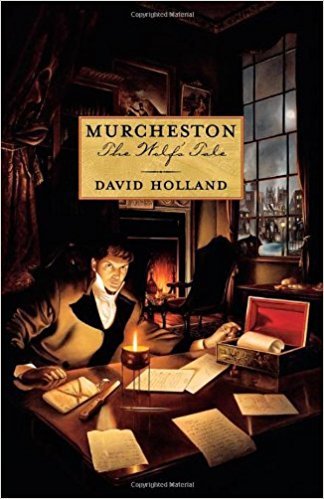 The writing itself was strong, to a degree-the author clearly has a mastery of the language, and I appreciated the descriptions of his nights as a wolf, and his increasingly faulty attempts to free himself from the restraints of society.
The writing itself was strong, to a degree-the author clearly has a mastery of the language, and I appreciated the descriptions of his nights as a wolf, and his increasingly faulty attempts to free himself from the restraints of society.
His moral degradation was interesting as well, as the usual werewolf trope of eating humans developed slowly. First it was indifference over his wolf form venturing too close to the house, then the village, having no remorse about butchering his servant's horse-how can he assign guilt, he claims, to a purely animal action, driven entirely by instinct? You can see the slippery slope there.
The main problem with the narrative was that it was all so tried and true. Nothing in this narrative surprised me, and the switch in voice was not sufficient in itself to make this story innovative. I saw it all coming, and most of the time the urgency of the story was sapped by being framed in another very brief and useless narrative. Nothing felt immediate or important. I wish the author had wrapped his words around a fresher idea.
K Rating: 1/5
**2017 New Author Goal - 25 out of 30**

 The writing itself was strong, to a degree-the author clearly has a mastery of the language, and I appreciated the descriptions of his nights as a wolf, and his increasingly faulty attempts to free himself from the restraints of society.
The writing itself was strong, to a degree-the author clearly has a mastery of the language, and I appreciated the descriptions of his nights as a wolf, and his increasingly faulty attempts to free himself from the restraints of society.His moral degradation was interesting as well, as the usual werewolf trope of eating humans developed slowly. First it was indifference over his wolf form venturing too close to the house, then the village, having no remorse about butchering his servant's horse-how can he assign guilt, he claims, to a purely animal action, driven entirely by instinct? You can see the slippery slope there.
The main problem with the narrative was that it was all so tried and true. Nothing in this narrative surprised me, and the switch in voice was not sufficient in itself to make this story innovative. I saw it all coming, and most of the time the urgency of the story was sapped by being framed in another very brief and useless narrative. Nothing felt immediate or important. I wish the author had wrapped his words around a fresher idea.
K Rating: 1/5
**2017 New Author Goal - 25 out of 30**

Published on January 06, 2018 05:22
December 31, 2017
Noble Intrigues - Louise de la Valliere
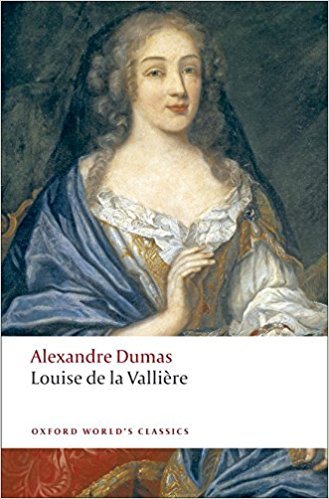
The beginning of a new year inevitably invites us to reflect on those that have passed, near and far. In 2017, I achieved my goal of reading 30 new authors. Some were misses, some were hits. All will be reviewed here in due course. But as the year draws to a close, my mind harkens back to continued reading of a tried and true author, about one of my favorite topics. It's a sign that no matter the genre, or the age, good writing never goes out of style.
Louise de la Vallière is the second volume of Alexandre Dumas' series, The Man in the Iron Mask, which is actually three parts: The Vicomte de Bragelonne, Louise de la Vallière, and The Man in the Iron Mask. It's an extension of the tale of the Three Musketeers, which is also separated into multiple parts (originally published serially). I read The Vicomte years ago, so it was hard to remember all the pertinent plot points of this tale filled with adventure, danger, and intrigue, set in France's history just as Louis XIV solidifies himself as the Sun King. While Dumas is one of my absolute favorite authors, and this story kept quick pace, it did have a different focus from the rest of his Musketeer history.
The first volume spent very little time with the young king Louis himself, focusing instead on the divergent agendas of the four musketeers as they advance in age and career. It mapped out (as clear as possible when following the intrigue) who they support and who supports them. This second volume focuses almost entirely on Louis and his court.
Courtiers of both sexes play active roles in a variety of intrigues-some political, some romantic, most a mixture of both. Louis' ministers struggle to find his favor by taking skillful, covert digs at each other, and D'Artagnan, as head of the royal guards, becomes the right hand of the king in all his desires-which first land squarely on Madame la Duchess de Orléans (his brother's wife, and sister to Charles, the King of England), then most passionately on her handmaiden Louise de la Vallière. You can probably guess how much Madame liked that.
The plotting of the Queens and Princess of the court (the Queen-Mother, Louis's wife, and his sister-in-law) would have been quite enough to hold my interest, but nothing is ever so simple. Louise de la Vallière is already engaged to Raoul, (the Vicomte de Bragelonne and the son of Athos, the Comte de la Fère), the other handmaiden Montalais is teaming up with men from the Duc de Orléan's household (the king's brother Philip), but seem eager to help the king secure his mistress and foil the Duchess. The story ends in this volume with the Duchess bringing Raoul back from an aimless trip to England, just in time to confirm the rumors that his fiancée is not above the king's temptation. The Minister of Finance Fouquet and his underling Colbert continue their bitter feud. Fouquet (who seems at times to be plotting against the king, as we saw in the previous volume), is moved in all things by Aramis, who is the Bishop of Vannes and, now, the secret General of the Order of Jesuits. Porthos is also influenced by Aramis, but is intercepted by D'Artagnan, who sees all that his friends do and the motivations behind them with such cavalier charm that he frightens the three musketeers (and thrills the reader). I can only hope there will be much more of him in the final installment, The Man in the Iron Mask, as his adventurous spirit is the heart of this well-loved saga. And if I didn't sympathize enough already with the Sun King, a young man trapped in a gilded cage, I do now.
I'd love to recommend this to anyone who loves historical fiction and political intrigues (GOT has nothing on this), but this is quite deep into an established series. You might be able to stay afloat if you picked up just this volume, but you will have missed much. Also, not all film renditions are faithful. The Man in the Iron Mask starring Leo DiCaprio is very far from the book's truth. So if this sounds up your alley, don't be put off by the age of the work. Go out there and get started on The Three Musketeers . I'll see you at the finish line.
Rating: 4.5/5
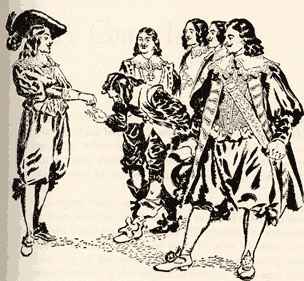
Published on December 31, 2017 14:52
December 24, 2017
Alias Grace - Brooding, Suspenseful, & Provocative
Margaret Atwood's book The Handmaid's Tale, and its Hulu adaptation, have been getting a lot of hype, but futuristic Puritans are just not my thing. My interest was piqued, however, by the description of
Alias Grace
, the Netflix adaptation of another work of hers. I was drawn in by the trial of an infamous murderess, and questions about her sanity, her memory, and her doctor's unseemly attraction to her.
I thoroughly enjoyed the show - it had great pacing and suspense as Grace tells her story to Dr. Jordan, who has been hired by a local philanthropic group seeking Grace's release from prison and an impending hanging. In the first episode, Grace's over- narration (which I assume is derived from Atwood's original text) makes it clear that she understands the power that her words wield, first at her trial, and now, in a new and intriguing way, through talk therapy.
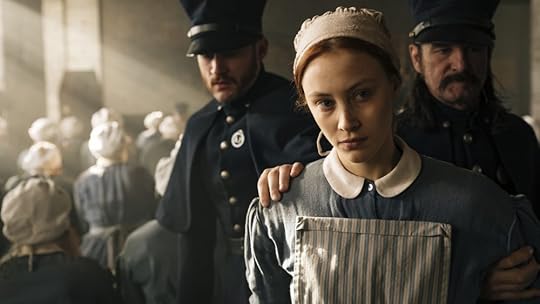
Grace's life story was fairly typical for the nineteenth-century immigrants, but that didn't make it any less heartbreaking. The production values and storytelling combined to make Grace's tale a compelling one, and was enhanced by the insight into Grace's mind in addition to what she tells Dr. Jordan. Another nice layer was Grace's mindset herself: life has taught her hard lessons. Her freedom is certainly limited, but she is not helpless, and the idea of blessings, curses, retribution, and ghosts gave everything a brooding gloss that, combined with some clever camera-work and scene-setting, gave this period piece something extra special. The dream sequence with the angels in the tree, for example, was so cleverly done, it was visually striking and powerful. It was probably one of the smartest and most disturbing T.V. moments I've seen in some time. The hypnotic session is a close second. Bravo. I didn't expect anything less from director Mary Harron (of American Psycho acclaim).
My only regret was the final episode, which felt rushed, and left me unsatisfied with the direction of each character's life at the end of the tale. It didn't feel fulfilling, almost like the premise that we were presented with at the beginning never received its denouement, which was a bummer after zipping through the whole season in a handful of nights. And, being a historian, I would have loved more of the context to be drawn out. The nineteenth century is an eventful, fascinating period for hypnotism, mesmerism, mental disease, female criminality, and all sorts of useful things. I could have done with more of that.
Shows like this, and the praise it is receiving, make me hopeful that more excellent TV programming that addresses these darker strains of storytelling are just on the horizon.
Rating: 5/5
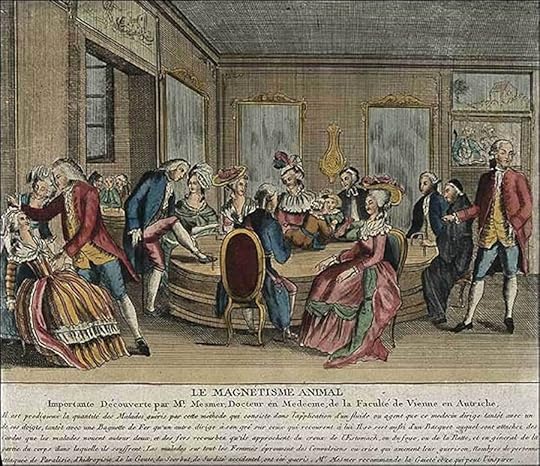
I thoroughly enjoyed the show - it had great pacing and suspense as Grace tells her story to Dr. Jordan, who has been hired by a local philanthropic group seeking Grace's release from prison and an impending hanging. In the first episode, Grace's over- narration (which I assume is derived from Atwood's original text) makes it clear that she understands the power that her words wield, first at her trial, and now, in a new and intriguing way, through talk therapy.

Grace's life story was fairly typical for the nineteenth-century immigrants, but that didn't make it any less heartbreaking. The production values and storytelling combined to make Grace's tale a compelling one, and was enhanced by the insight into Grace's mind in addition to what she tells Dr. Jordan. Another nice layer was Grace's mindset herself: life has taught her hard lessons. Her freedom is certainly limited, but she is not helpless, and the idea of blessings, curses, retribution, and ghosts gave everything a brooding gloss that, combined with some clever camera-work and scene-setting, gave this period piece something extra special. The dream sequence with the angels in the tree, for example, was so cleverly done, it was visually striking and powerful. It was probably one of the smartest and most disturbing T.V. moments I've seen in some time. The hypnotic session is a close second. Bravo. I didn't expect anything less from director Mary Harron (of American Psycho acclaim).
My only regret was the final episode, which felt rushed, and left me unsatisfied with the direction of each character's life at the end of the tale. It didn't feel fulfilling, almost like the premise that we were presented with at the beginning never received its denouement, which was a bummer after zipping through the whole season in a handful of nights. And, being a historian, I would have loved more of the context to be drawn out. The nineteenth century is an eventful, fascinating period for hypnotism, mesmerism, mental disease, female criminality, and all sorts of useful things. I could have done with more of that.
Shows like this, and the praise it is receiving, make me hopeful that more excellent TV programming that addresses these darker strains of storytelling are just on the horizon.
Rating: 5/5

Published on December 24, 2017 11:37
December 15, 2017
Disappointingly Dull: Disappearance at Devil's Rock
I am very choosy with my suspense/thriller novels, and came to Paul Tremblay's Disappearance at Devil's Rock with great excitement. Finally, I thought, the disappearance of a child that is somehow related to darker, more horror-based themes. If only.
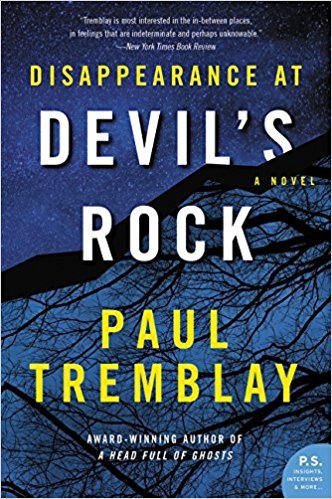 The devilish aspects of the story set up some interesting premises: the legend of Devil's rock, where supposedly the devil, being tricked, has been trapped inside the rock, and the use of masonic/occult symbols in the hobo pennies created by Arnold, a twenty-something self-professed "seer" who is involved with three young teenagers when one of them goes missing.
The devilish aspects of the story set up some interesting premises: the legend of Devil's rock, where supposedly the devil, being tricked, has been trapped inside the rock, and the use of masonic/occult symbols in the hobo pennies created by Arnold, a twenty-something self-professed "seer" who is involved with three young teenagers when one of them goes missing.
The spectral, ghost-like elements were interesting as well. The doppelganger of Tommy, the missing boy, was well described, but all these things amounted to nothing really-almost just flavor text. These more interesting elements take up very little room in the book, and don't affect the plot in any meaningful way. Which was very sad, because the ideas were relatively new and had a lot of potential.
Instead, I was inundated with a mundane story about the fruitless search for Tommy following his disappearance, which focused on his mother and her household, sans her son. We are also privy to extensive flashbacks via Tommy's journal pages, which mysteriously appear at intervals, to explain how Arnold came to be part of his little group. Because of the framing of that story, it was robbed of narrative tension or urgency. In addition, an enormous amount of time is relegated to recounting every useless detail of conversation between young teens and an obsession with zombies that could have had meaning and gone somewhere, but didn't.
The main thrust of the story was attempting to display an authentic window into young life, and predominantly the force of deceit for young children, the almost second nature of lying at that age. While that might be true, it doesn't make for compelling storytelling, and I felt that so much time was spent on useless characterization that the things that might have made this story interesting were arbitrarily inserted, and didn't really do anything to help the very dull and dreary plot of a naive, malleable kid being led astray by an older boy. And the devil should be anything but dull.
K Rating: 1/5
**New Author Goal: 23 out of 30**
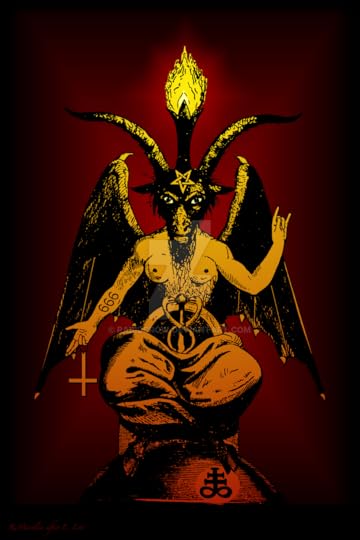
 The devilish aspects of the story set up some interesting premises: the legend of Devil's rock, where supposedly the devil, being tricked, has been trapped inside the rock, and the use of masonic/occult symbols in the hobo pennies created by Arnold, a twenty-something self-professed "seer" who is involved with three young teenagers when one of them goes missing.
The devilish aspects of the story set up some interesting premises: the legend of Devil's rock, where supposedly the devil, being tricked, has been trapped inside the rock, and the use of masonic/occult symbols in the hobo pennies created by Arnold, a twenty-something self-professed "seer" who is involved with three young teenagers when one of them goes missing.The spectral, ghost-like elements were interesting as well. The doppelganger of Tommy, the missing boy, was well described, but all these things amounted to nothing really-almost just flavor text. These more interesting elements take up very little room in the book, and don't affect the plot in any meaningful way. Which was very sad, because the ideas were relatively new and had a lot of potential.
Instead, I was inundated with a mundane story about the fruitless search for Tommy following his disappearance, which focused on his mother and her household, sans her son. We are also privy to extensive flashbacks via Tommy's journal pages, which mysteriously appear at intervals, to explain how Arnold came to be part of his little group. Because of the framing of that story, it was robbed of narrative tension or urgency. In addition, an enormous amount of time is relegated to recounting every useless detail of conversation between young teens and an obsession with zombies that could have had meaning and gone somewhere, but didn't.
The main thrust of the story was attempting to display an authentic window into young life, and predominantly the force of deceit for young children, the almost second nature of lying at that age. While that might be true, it doesn't make for compelling storytelling, and I felt that so much time was spent on useless characterization that the things that might have made this story interesting were arbitrarily inserted, and didn't really do anything to help the very dull and dreary plot of a naive, malleable kid being led astray by an older boy. And the devil should be anything but dull.
K Rating: 1/5
**New Author Goal: 23 out of 30**

Published on December 15, 2017 04:06
December 7, 2017
Fresh & Whimsical : The Paper Magician
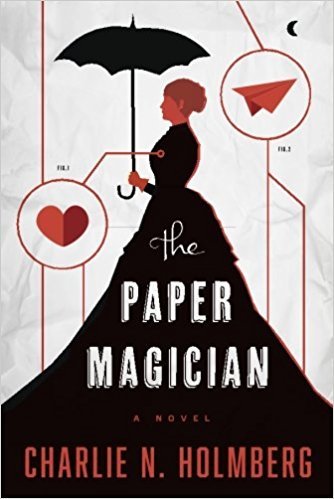 I usually don't care for whimsy in my reading material, but The Paper Magician toed the line so closely, I enjoyed the story for all its parts. I was drawn in by the premise of a new magical novice being forced to bond to a material, paper, when all she ever wanted to be was a metal magician. Being the first in her class has deprived her of her choice, but when she meets Paper Magician Emery Thane, her mind quickly sees the wonder of her new future. The use of paper for magic started with some predictable forms of origami-interesting, but predictable- and then moved on to things I wouldn't have thought of which had much more power and potential. That we learned more about the possibilities with paper as the story developed was immensely satisfying.
I usually don't care for whimsy in my reading material, but The Paper Magician toed the line so closely, I enjoyed the story for all its parts. I was drawn in by the premise of a new magical novice being forced to bond to a material, paper, when all she ever wanted to be was a metal magician. Being the first in her class has deprived her of her choice, but when she meets Paper Magician Emery Thane, her mind quickly sees the wonder of her new future. The use of paper for magic started with some predictable forms of origami-interesting, but predictable- and then moved on to things I wouldn't have thought of which had much more power and potential. That we learned more about the possibilities with paper as the story developed was immensely satisfying.I found both Emery Thane and Ceony Twill intriguing, endearing, and complex as characters, and how their relationship as teacher and apprentice grows kept my interest. The main action of the plot, while definitely compelling, took an unexpected detour through Emery Thane's heart - literally. While this was certainly a unique way to answer some of the beginning's mysteries-why Emery Thane lives alone, how his ex-wife became an Excisioner, or Blood Magician, and why Thane gave her a secret scholarship that allowed her to attend magic school in the first place, the journey through Thane's heart was very drawn out, taking up about two-thirds of the book.
I expected to see more of the aftermath in this book before moving on to the next volume. Ceony makes it out of his fourth chamber, forced to admit her attraction to a shadowy version of Thane, and coming out of it not knowing how much he truly understands of what she saw and what she did while there.
The conclusion after Ceony's escape from Thane's heart feels rushed, but is also enticing. Ceony discovers a great power to defeat the blood-thirsty ex-wife, and she receives a vision of a fortune, a happy future for her and Emery. But when will that come to pass? Only the rest of the series will tell, and I am eager for the next volume.
Rating: 4/5
**New Author Goal:22 out of 30**
 Who knew such things could hold such power?
Who knew such things could hold such power?
Published on December 07, 2017 04:32
December 3, 2017
Better than the Blob! Caltiki, the Immortal Monster!!
I'm a sucker for stories that riff off H.P. Lovecraft's "The Colour Out of Space," a story about a monstrous force from the heavens. The Blob certainly fits the bill, but many aspects of that film are rather neat and tidy.
Not Caltiki, The Immortal Monster (1959). Caltiki is a cross between The Blob and Creature from the Black Lagoon . Made just one year after The Blob, Caltiki is a dangerous substance buried among Mayan ruins, which grows insatiable every time a comet passes close to earth, giving it the power to grow to enormous proportions, and swallow up everything and everyone in its path. The fact that you actually see Caltiki eating people, dissolving their flesh in seconds and leaving nothing but bones, is totally freakin' awesome!
The use of miniatures - tanks included! really helped to convey the sheer size and serious danger of this immortal force, thought to have destroyed the Mayans, and due to return with a vengeance as the comet inevitably passes Earth.
In short, Caltiki, The Immortal Monster is tremendous fun, and should not be missed by fans of monster movies, classics, and blobs alike!
K Rating: 5/5

Not Caltiki, The Immortal Monster (1959). Caltiki is a cross between The Blob and Creature from the Black Lagoon . Made just one year after The Blob, Caltiki is a dangerous substance buried among Mayan ruins, which grows insatiable every time a comet passes close to earth, giving it the power to grow to enormous proportions, and swallow up everything and everyone in its path. The fact that you actually see Caltiki eating people, dissolving their flesh in seconds and leaving nothing but bones, is totally freakin' awesome!
The use of miniatures - tanks included! really helped to convey the sheer size and serious danger of this immortal force, thought to have destroyed the Mayans, and due to return with a vengeance as the comet inevitably passes Earth.
In short, Caltiki, The Immortal Monster is tremendous fun, and should not be missed by fans of monster movies, classics, and blobs alike!
K Rating: 5/5

Published on December 03, 2017 13:46
December 1, 2017
All Terribly True - Mr. Mercedes
Mr. Mercedes is the first thriller I've read of Stephen King's, and it was solid. It was as down-to-earth authentic as all of his works are, but, if not for the darker strains in his writing, I might not have finished the book.
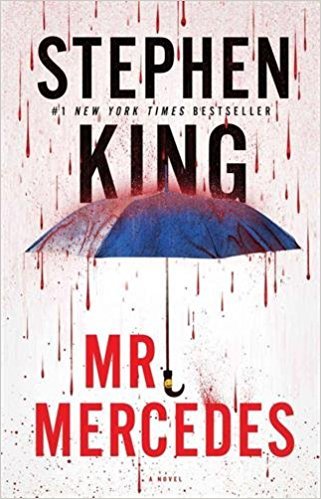 The Mercedes Killer is just your average Joe, with an effed up family dynamic, and decides to steal a Mercedes and plow it into a crowd of unemployed citizens. When the cop who couldn't catch him retires, Mr. Mercedes starts pulling his strings. Big mistake.
The Mercedes Killer is just your average Joe, with an effed up family dynamic, and decides to steal a Mercedes and plow it into a crowd of unemployed citizens. When the cop who couldn't catch him retires, Mr. Mercedes starts pulling his strings. Big mistake.
The plot is interesting because you're getting a detailed, inside look at both the retired detective Hodges's attempts to ferret out the killer before he does something even more heinous, and the killer Brady Hartsfield, who takes the bait but can take as much as he can dish. The suspense came not from not knowing the killer, but from not knowing when these two are going to have their confrontation, and whether it will be horribly too late.
Having read Pet Sematary many years ago, I know that no level of chaos or destruction is beyond King, so every sick suggestion that popped into Brady's head put me on the edge of the page. How some of his ideas turned back on him was equally disturbing, but funny all the same. And while the book was loaded with very timely observations and references that made me roll my eyes, some of them made me genuinely laugh out loud. King is nothing if not an astute observer of his world, and of human nature.
The supporting characters were well developed, and I especially appreciated the varying levels of mental dysfunction among them. All those ticks and assumptions and personalities kept the investigative aspect of the novel tight.
I may not pick up the rest of the Hodge's trilogy, but that's a function of my reading to escape my world, rather than drown in its everyday horrors. And while this is not The Shining, I don't regret reading it, either. I only wish it were further from the truth.
Rating: 4/5
 The Mercedes Killer is just your average Joe, with an effed up family dynamic, and decides to steal a Mercedes and plow it into a crowd of unemployed citizens. When the cop who couldn't catch him retires, Mr. Mercedes starts pulling his strings. Big mistake.
The Mercedes Killer is just your average Joe, with an effed up family dynamic, and decides to steal a Mercedes and plow it into a crowd of unemployed citizens. When the cop who couldn't catch him retires, Mr. Mercedes starts pulling his strings. Big mistake.The plot is interesting because you're getting a detailed, inside look at both the retired detective Hodges's attempts to ferret out the killer before he does something even more heinous, and the killer Brady Hartsfield, who takes the bait but can take as much as he can dish. The suspense came not from not knowing the killer, but from not knowing when these two are going to have their confrontation, and whether it will be horribly too late.
Having read Pet Sematary many years ago, I know that no level of chaos or destruction is beyond King, so every sick suggestion that popped into Brady's head put me on the edge of the page. How some of his ideas turned back on him was equally disturbing, but funny all the same. And while the book was loaded with very timely observations and references that made me roll my eyes, some of them made me genuinely laugh out loud. King is nothing if not an astute observer of his world, and of human nature.
The supporting characters were well developed, and I especially appreciated the varying levels of mental dysfunction among them. All those ticks and assumptions and personalities kept the investigative aspect of the novel tight.
I may not pick up the rest of the Hodge's trilogy, but that's a function of my reading to escape my world, rather than drown in its everyday horrors. And while this is not The Shining, I don't regret reading it, either. I only wish it were further from the truth.
Rating: 4/5
Published on December 01, 2017 05:39
November 18, 2017
Ambiguously Feminist: The Miniaturist
My latest historical fiction read,
The Miniaturist
, started out strong. A young girl Nella can't stand that her new husband remains a stranger, in every sense of the word, that her spinster sister-in-law is intolerable, and all she has to get her from one day to the next is her hideous wedding present, a miniature doll house. That dollhouse is slowly filled with figures contrived in such a way to shine an ominous light on the inner workings of her household, from the mysterious miniaturist. At least, that's what Nella thinks.
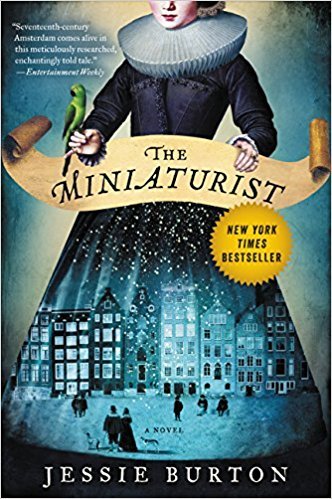 All that sounded great, and I certainly able to imagine myself in imperial Amsterdam. But once the story started to unfold, the magic of its premise fizzled and faded away. The reason for Mr. Brandt's distance is written dramatically, but everything that follows after is equal parts confusing and frustrating. The secrets that Nella learns of her new husband are ones that give her, a girl of noble birth, enormous power within the household. But she remains mousy, and never wields that power. Even if her family had financial problems, she was born into entitlement, and her reactions-basically letting the Brandt family run roughshod over her- doesn't feel historically authentic. It feels more like poor characterization.
All that sounded great, and I certainly able to imagine myself in imperial Amsterdam. But once the story started to unfold, the magic of its premise fizzled and faded away. The reason for Mr. Brandt's distance is written dramatically, but everything that follows after is equal parts confusing and frustrating. The secrets that Nella learns of her new husband are ones that give her, a girl of noble birth, enormous power within the household. But she remains mousy, and never wields that power. Even if her family had financial problems, she was born into entitlement, and her reactions-basically letting the Brandt family run roughshod over her- doesn't feel historically authentic. It feels more like poor characterization.
At the same time, Mr. Brandt is villainized, not because of the nature of his secret, but because of the misery he imposes on his entire family for ensnaring them in his secret, and his own neglect of his obligations-to his wife, his sister, and his business. But it's painfully obvious that the author did not want to demonize him for being gay. Which is all well and good except, again, it's not historically authentic..
Another major anachronism ran through the heart of Nella's characterization. That she's invisible in society, and in her household, because of her age. A child bride of only eighteen tender years. She is constantly referred to as a child but her new family, and feels that way herself at least some of the time. The miniature house itself is the largest indicator of that. It's a toy, a plaything for young girls to learn the running of a household. EXCEPT: She's not a child bride, not in seventeenth-century Amsterdam. Girls younger than her were married and mothers. Not a soul would have thought her in such terms.
The thing that interested me so much in this book was the suggestion of darker, potentially supernatural fiction. Or even simply weird fiction would have been satisfying. This was none of those things. The answer to just who the miniaturist is is very bland at disappointing. There were so many other viable possibilities. What Burton went with is the most banal choice. She tried, maybe, but the effort was so slight you might miss it. You'll be too busy fending off heavy blows from the naked misandrist message. Which is convoluted, because even the guy pulling everyone else's strings dies in the end. It's clear Burton is trying to make some sort of statement about the misery of seventeenth-century women, but it's extremely unclear as to what that is. Also, it felt unnecessary. We could have had a much better plot that had that deeper under the surface to give it meaning, but without that plot, whatever it is Burton thinks she's saying looks like a trumped-up soapbox.
Rating: 2/5
**New Author Goal: 24** Only a half dozen more to go!!

 All that sounded great, and I certainly able to imagine myself in imperial Amsterdam. But once the story started to unfold, the magic of its premise fizzled and faded away. The reason for Mr. Brandt's distance is written dramatically, but everything that follows after is equal parts confusing and frustrating. The secrets that Nella learns of her new husband are ones that give her, a girl of noble birth, enormous power within the household. But she remains mousy, and never wields that power. Even if her family had financial problems, she was born into entitlement, and her reactions-basically letting the Brandt family run roughshod over her- doesn't feel historically authentic. It feels more like poor characterization.
All that sounded great, and I certainly able to imagine myself in imperial Amsterdam. But once the story started to unfold, the magic of its premise fizzled and faded away. The reason for Mr. Brandt's distance is written dramatically, but everything that follows after is equal parts confusing and frustrating. The secrets that Nella learns of her new husband are ones that give her, a girl of noble birth, enormous power within the household. But she remains mousy, and never wields that power. Even if her family had financial problems, she was born into entitlement, and her reactions-basically letting the Brandt family run roughshod over her- doesn't feel historically authentic. It feels more like poor characterization.At the same time, Mr. Brandt is villainized, not because of the nature of his secret, but because of the misery he imposes on his entire family for ensnaring them in his secret, and his own neglect of his obligations-to his wife, his sister, and his business. But it's painfully obvious that the author did not want to demonize him for being gay. Which is all well and good except, again, it's not historically authentic..
Another major anachronism ran through the heart of Nella's characterization. That she's invisible in society, and in her household, because of her age. A child bride of only eighteen tender years. She is constantly referred to as a child but her new family, and feels that way herself at least some of the time. The miniature house itself is the largest indicator of that. It's a toy, a plaything for young girls to learn the running of a household. EXCEPT: She's not a child bride, not in seventeenth-century Amsterdam. Girls younger than her were married and mothers. Not a soul would have thought her in such terms.
The thing that interested me so much in this book was the suggestion of darker, potentially supernatural fiction. Or even simply weird fiction would have been satisfying. This was none of those things. The answer to just who the miniaturist is is very bland at disappointing. There were so many other viable possibilities. What Burton went with is the most banal choice. She tried, maybe, but the effort was so slight you might miss it. You'll be too busy fending off heavy blows from the naked misandrist message. Which is convoluted, because even the guy pulling everyone else's strings dies in the end. It's clear Burton is trying to make some sort of statement about the misery of seventeenth-century women, but it's extremely unclear as to what that is. Also, it felt unnecessary. We could have had a much better plot that had that deeper under the surface to give it meaning, but without that plot, whatever it is Burton thinks she's saying looks like a trumped-up soapbox.
Rating: 2/5
**New Author Goal: 24** Only a half dozen more to go!!

Published on November 18, 2017 14:08
November 7, 2017
Emo Politics - Burning Glass
I can never get enough royal intrigues, and despite its (many) flaws, Burning Glass kept me anxiously turning pages.
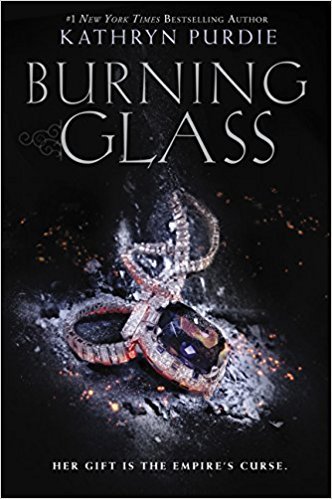 Auraseers, people who can sense the secret emotions of those around them, are an invaluable asset to the King. But when the King's brother Anton comes to fetch her, Sonya isn't ready. She has no control over the emotions that invade her mind, and hasn't learned to differentiate the feelings of others from her own. To top it off, her lack of discipline caused her orphanage/convent to burn to the ground, when the will of the angry mob at its gates overtook her.
Auraseers, people who can sense the secret emotions of those around them, are an invaluable asset to the King. But when the King's brother Anton comes to fetch her, Sonya isn't ready. She has no control over the emotions that invade her mind, and hasn't learned to differentiate the feelings of others from her own. To top it off, her lack of discipline caused her orphanage/convent to burn to the ground, when the will of the angry mob at its gates overtook her.
Sonya isn't at all prepared to combat the powerful will of King Valko. It becomes clear quite soon that her physical attraction to him is simply a mirror of his desire. It is most interesting when we see the tumultuous nature of his emotions and thoughts, and it becomes clearer and clearer that the King is mentally unstable.
Harder still are the people in the King's court who have learned to hide their emotions. That served as a crutch to the plot, given the main job of the Auraseer is to understand people's emotions. Of course people try to hide their emotions-especially politicians. So why can't she see past their barriers? Is it because she wasn't fully trained? Maybe. But it seems more of a plot device to keep us guessing about Duke Anton's feelings for Sonya, and which of the brothers she has real feelings for.
I appreciated very much that the setting was more Russian-inspired, though the world-building wasn't taken far enough. There were plenty of breadcrumbs there that are the start of good fantasy- the question of a changeling prince, a poisoned monarch, an ambitious and well-meaning brother, and a lot of potential poisoners among the courtiers. But the development of these in any real sense was forgotten for the sake of the romantic tension, which is the basis of the story. I won't say that I minded that, because that part was good, but there were plenty of detractors. One of the worst offenders were the people from the neighboring fantasy land, who walked, looked, and spoke French. Major fantasy faux-pas. Also, Anton's vision for the future of his kingdom seemed naive and far-fetched. Revolution is never a clean, simple thing, and the deposition of one king is not enough. Perhaps if her research for world-building had gone beyond national window dressings, the author might have recognized this, making a revolution more gritty, and you know, authentic, but I digress.
Another issue for me was the complete uselessness of Sonya herself. I would have expected and preferred to see her grow into her role, and use her power effectively. We get almost the exact opposite, where she gets sucked further and further into Valko's influence, until the last minute where she basically pulls off a miracle-it's an inorganic, unconvincing conclusion to the plot. But who cares, when Sonya actually manages to figure out how she feels? Flawed as it admittedly is, I can still say yes, this story could have been much much better, but, at $2, I will read the sequel anyways.
Rating: 3/5
*New Author Goal: 21**

#22: Kepler's Witch - Wouldn't you know, the first time in ages I pick up a nonfiction book, and I'm deceived by the back copy into thinking it will be worthwhile.
#23: Anno Dracula - Again, the back copy kills me. Alternative history where Dracula wins? Great! No plot or characterization, only name dropping? Not so much.
 Auraseers, people who can sense the secret emotions of those around them, are an invaluable asset to the King. But when the King's brother Anton comes to fetch her, Sonya isn't ready. She has no control over the emotions that invade her mind, and hasn't learned to differentiate the feelings of others from her own. To top it off, her lack of discipline caused her orphanage/convent to burn to the ground, when the will of the angry mob at its gates overtook her.
Auraseers, people who can sense the secret emotions of those around them, are an invaluable asset to the King. But when the King's brother Anton comes to fetch her, Sonya isn't ready. She has no control over the emotions that invade her mind, and hasn't learned to differentiate the feelings of others from her own. To top it off, her lack of discipline caused her orphanage/convent to burn to the ground, when the will of the angry mob at its gates overtook her.Sonya isn't at all prepared to combat the powerful will of King Valko. It becomes clear quite soon that her physical attraction to him is simply a mirror of his desire. It is most interesting when we see the tumultuous nature of his emotions and thoughts, and it becomes clearer and clearer that the King is mentally unstable.
Harder still are the people in the King's court who have learned to hide their emotions. That served as a crutch to the plot, given the main job of the Auraseer is to understand people's emotions. Of course people try to hide their emotions-especially politicians. So why can't she see past their barriers? Is it because she wasn't fully trained? Maybe. But it seems more of a plot device to keep us guessing about Duke Anton's feelings for Sonya, and which of the brothers she has real feelings for.
I appreciated very much that the setting was more Russian-inspired, though the world-building wasn't taken far enough. There were plenty of breadcrumbs there that are the start of good fantasy- the question of a changeling prince, a poisoned monarch, an ambitious and well-meaning brother, and a lot of potential poisoners among the courtiers. But the development of these in any real sense was forgotten for the sake of the romantic tension, which is the basis of the story. I won't say that I minded that, because that part was good, but there were plenty of detractors. One of the worst offenders were the people from the neighboring fantasy land, who walked, looked, and spoke French. Major fantasy faux-pas. Also, Anton's vision for the future of his kingdom seemed naive and far-fetched. Revolution is never a clean, simple thing, and the deposition of one king is not enough. Perhaps if her research for world-building had gone beyond national window dressings, the author might have recognized this, making a revolution more gritty, and you know, authentic, but I digress.
Another issue for me was the complete uselessness of Sonya herself. I would have expected and preferred to see her grow into her role, and use her power effectively. We get almost the exact opposite, where she gets sucked further and further into Valko's influence, until the last minute where she basically pulls off a miracle-it's an inorganic, unconvincing conclusion to the plot. But who cares, when Sonya actually manages to figure out how she feels? Flawed as it admittedly is, I can still say yes, this story could have been much much better, but, at $2, I will read the sequel anyways.
Rating: 3/5
*New Author Goal: 21**

#22: Kepler's Witch - Wouldn't you know, the first time in ages I pick up a nonfiction book, and I'm deceived by the back copy into thinking it will be worthwhile.
#23: Anno Dracula - Again, the back copy kills me. Alternative history where Dracula wins? Great! No plot or characterization, only name dropping? Not so much.
Published on November 07, 2017 18:57



